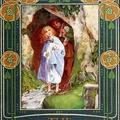CHAPTER 12
A Short Chapter About Curdie
Curdie spent many nights in the mine. His father and he had taken Mrs. Peterson into the secret, for they knew mother could hold her tongue, which was more than could be said of all the miners' wives. But Curdie did not tell her that every night he spent in the mine, part of it went in earning a new red petticoat for her.
Mrs. Peterson was such a nice good mother! All mothers are nice and good more or less, but Mrs. Peterson was nice and good all more and no less. She made and kept a little heaven in that poor cottage on the high hillside for her husband and son to go home to out of the low and rather dreary earth in which they worked. I doubt if the princess was very much happier even in the arms of her huge great-grandmother than Peter and Curdie were in the arms of Mrs. Peterson. True, her hands were hard and chapped and large, but it was with work for them; and therefore, in the sight of the angels, her hands were so much the more beautiful. And if Curdie worked hard to get her a petticoat, she worked hard every day to get him comforts which he would have missed much more than she would a new petticoat even in winter. Not that she and Curdie ever thought of how much they worked for each other: that would have spoiled everything.
When left alone in the mine Curdie always worked on for an hour or two at first, following the lode which, according to Glump, would lead at last into the deserted habitation. After that, he would set out on a reconnoitring expedition. In order to manage this, or rather the return from it, better than the first time, he had bought a huge ball of fine string, having learned the trick from Hop-o'-my-Thumb, whose history his mother had often told him. Not that Hop-o'-my-Thumb had ever used a ball of string--I should be sorry to be supposed so far out in my classics--but the principle was the same as that of the pebbles. The end of this string he fastened to his pickaxe, which figured no bad anchor, and then, with the ball in his hand, unrolling it as he went, set out in the dark through the natural gangs of the goblins' territory. The first night or two he came upon nothing worth remembering; saw only a little of the home-life of the cobs in the various caves they called houses; failed in coming upon anything to cast light upon the foregoing design which kept the inundation for the present in the background. But at length, I think on the third or fourth night, he found, partly guided by the noise of their implements, a company of evidently the best sappers and miners amongst them, hard at work. What were they about? It could not well be the inundation, seeing that had in the meantime been postponed to something else. Then what was it? He lurked and watched, every now and then in the greatest risk of being detected, but without success. He had again and again to retreat in haste, a proceeding rendered the more difficult that he had to gather up his string as he returned upon its course. It was not that he was afraid of the goblins, but that he was afraid of their finding out that they were watched, which might have prevented the discovery at which he aimed. Sometimes his haste had to be such that, when he reached home towards morning, his string, for lack of time to wind it up as he 'dodged the cobs', would be in what seemed most hopeless entanglement; but after a good sleep, though a short one, he always found his mother had got it right again. There it was, wound in a most respectable ball, ready for use the moment he should want it!
'I can't think how you do it, mother,' he would say. 'I follow the thread,' she would answer--'just as you do in the mine.' She never had more to say about it; but the less clever she was with her words, the more clever she was with her hands; and the less his mother said, the more Curdie believed she had to say. But still he had made no discovery as to what the goblin miners were about.

